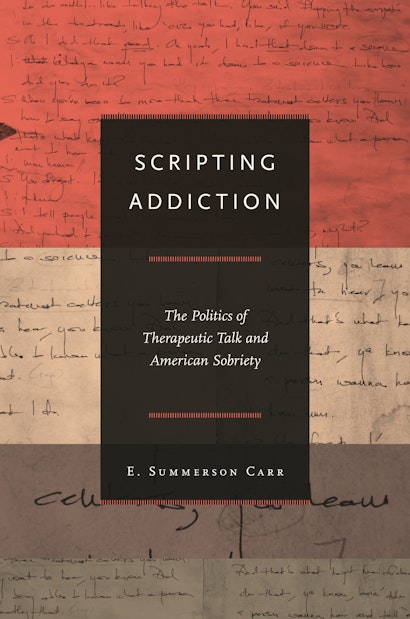Scripting Addiction takes readers into the highly ritualized world of mainstream American addiction treatment. It is a world where clinical practitioners evaluate how drug users speak about themselves and their problems, and where the ideal of “healthy” talk is explicitly promoted, carefully monitored, and identified as the primary sign of therapeutic progress. The book explores the puzzling question: why do addiction counselors dedicate themselves to reconciling drug users’ relationship to language in order to reconfigure their relationship to drugs?
To answer this question, anthropologist Summerson Carr traces the charged interactions between counselors, clients, and case managers at “Fresh Beginnings,” an addiction treatment program for homeless women in the midwestern United States. She shows that shelter, food, and even the custody of children hang in the balance of everyday therapeutic exchanges, such as clinical assessments, individual therapy sessions, and self-help meetings. Acutely aware of the high stakes of self-representation, experienced clients analyze and learn to effectively perform prescribed ways of speaking, a mimetic practice they call “flipping the script.”
As a clinical ethnography, Scripting Addiction examines how decades of clinical theorizing about addiction, language, self-knowledge, and sobriety is manifested in interactions between counselors and clients. As an ethnography of the contemporary United States, the book demonstrates the complex cultural roots of the powerful clinical ideas that shape therapeutic transactions—
and by extension administrative routines and institutional dynamics—at sites such as “Fresh Beginnings.”
Awards and Recognition
- Winner of the 2012 Edward Sapir Book Prize, Society for Linguistic Anthropology
"[A] fresh and thought-provoking perspective on the interaction between addiction professionals and their clients. [Scripting Addiction] is also a remarkable window onto American personhood in general. It shows in unusually precise terms how this personhood is produced by linguistic interactions that shape the institutions in which they occur."—Lorna Rhodes, Social Service Review
"In simplest terms, this book can be read as an ethnographic description of a mandated outpatient drug-treatment program for homeless women. In another sense, it includes a brief history of changing views toward social work in the US since the 1950s. Although not explicitly organized as such, it is also a thoughtful, critical commentary on the rationale, methods, and efficacy of such treatment."—Choice
"Summerson Carr's focus on linguistic practices is a refreshing approach to studying welfare, addiction, and therapy, exposing the way language gets nudged around to yield things that resemble palatable truths."—Chantal Butchinsky, Journal of the Royal Anthropological Institute
"The added value of this ethnography lies in its uncovering of the profound impact of ideological assumptions about language and of ideology in language on everyday institutional practices and, ultimately, the everyday lives of clients by providing a detailed account of institutional practices in mainstream American addiction treatment."—Karen Mogendorff, Social Anthropology
"There is much to like about this intriguing and subtly argued book. Its human interest and drama, as the story of Rhonda and Louise suggests, is not the least of it. I came away from the detailed scenes of interviews and board meetings impressed with Carr's intelligence and thoughtfulness as an ethnographer. Readers can get a vivid sense of both clients and staff. Best of all is how concrete this study is. . . . Carr's evidence and analysis are clear. She reveals a living language, whose flow she traces from intake interviews, to therapy sessions, to client case meetings, to board rooms."—Stephanie Muravchik, Society
"Scripting Addiction screams with many voices that there is no neutral language. . . . Therefore, it is a powerful call to better realize what is happening in and through language at sites all around us that carry huge potential to either serve humankind, or cause suffering. It is an important and well-articulated call."—Mark A. Leeman, Discourse Studies
"Scripting Addiction is an original and meticulous ethnographic account of a decidedly post-Freudian 'talking cure,' in a treatment program for drug addiction. One of the book's notable successes is its account of how clients acquire skills necessary for reading, analyzing, and strategically responding to the social-service transactions that are integral to their lives."—Allan Young, McGill University
"Summerson Carr explores the consequential nexus of language, personhood, therapy, welfare policy, and social-work practice with imagination and subtlety. Deeply textured and intellectually exhilarating, Scripting Addiction is a rich and revelatory account of a specific therapeutic site and an extraordinary model for attuned, reflective, and generative ethnography. This is certain to become a classic in the anthropology of complex institutions—and of the broader ideologies and social relations with which they are entangled."—Donald Brenneis, University of California, Santa Cruz
"Pathbreaking. The book incorporates a fine-grained ethnography of drug treatment and treatment philosophies, and will make a substantial contribution to our understanding of how language and identity function in this institutional setting. Carr displays a deft facility for articulating a number of important perspectives in social work, drug therapy, social theory, and linguistic theory. Scripting Addiction is a scholarly masterpiece."—Gregory M. Matoesian, author of Law and the Language of Identity
"A fascinating contribution to scholarship. Carr has very effectively, thoroughly, and skillfully used ethnography and sociolinguistics to empirically demonstrate the dark side of clinical language practices. Her careful linguistic approach methodically shows how therapeutic language can be used to constrain rather than open up possibilities."—Jerry Floersch, author of Meds, Money, and Manners: The Case Management of Severe Mental Illness

